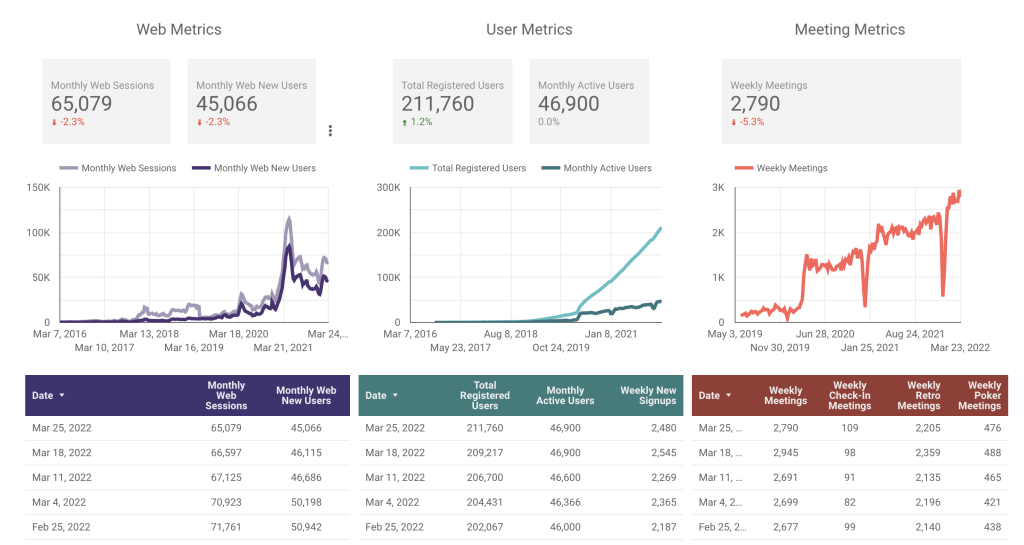#292 – A 4-Day Work Week?
March 25, 2022

This week, our members participated in a process to shape an experiment aimed to test whether Parabol should move toward a 4-day workweek.
As a company, we’re always seeking ways to make our work more productive, more meaningful, and in better harmony with our lives. At the last team retreat, a group of folks looked into what kinds of additional benefits our members desired to improve their work life. The group conducted a survey of the organization and at the most popularly requested benefit was the 4-day work week. The group performed research into other organizations who had experimented with or moved to a 4-day work week. They learned the 4-day work week seemed to benefit the organizations they had studied without harming productivity. They felt comfortable recommending Parabol conduct an experiment ourselves and drafted a proposal that would be safe for our company to try.
The initial proposal for a 4-Day workweek experiment
Changes at Parabol are not made by decree on high. Rather, any member of our organization can use a formal process for making change. Most changes happen at the team level, change that requires the consent of the entire company are possible too.
Big changes, like adopting a new company rhythm, have a better chance of being tried if they can be reduced in scope to smaller experiments. That is how the group bringing the 4-day work week proposal decided to proceed. Initially the proposal was specified as:
- Taking every other Friday off
- Encouraging people to take these days off, but it is optional to participate in the experiment
- Measuring success by collecting quantitative data and qualitative before, during, and after the experiment, including productivity data, stress data, and if the member is participating in the experiment
Reactions to the initial 4-Day workweek proposal
Proposals at Parabol are responded to asynchronously, in the original document and in Slack. By far, this proposal has earned the most attention of any all-company proposal. So far, our 25-person team wrote more than 40 responses to this proposal. Here are some of them:
Parabol Member A wrote:
- I like the thought that’s gone into measuring success. Perhaps if someone at the end of the experiment feels that it was a success, they could create a new (even spicier!) governance proposal to make it permanent? Everyone could interpret the data how they see fit and decide whether to object to the proposal.
- Intuitively, I feel that I get more done in 5 days than 4. The data suggests differently, although it’s good to be extra skeptical of data that tells people what they want to believe.
- We work in an industry where the average employee tenure is often ~2 years, meaning most companies only get a short window of productivity from employees. By creating a culture where people want to work for many years, Parabol makes employees happy and has a real competitive advantage. People that I’ve spoken to that have 4 day work weeks wouldn’t consider working at a company that has a 5 day work week. So, if a 4 day work week increases employee tenure and attracts more talent, it’s probably a smart move.
- A concern is that 4 day work weeks could attract talent that want a relaxing gig. I dislike branding us as a lifestyle business or as a place that’s good for burnouts, a term we’ve occasionally used internally. As a start-up, it’s important that we continue to have a hard-working culture as we don’t have the business moats in place that allow us to chill, a luxury that a company like Google arguably has. Still, I think we can certainly have a 4 day work week and a hard-working culture by being cognizant of this during the interview stage and how we refer to the company internally.
- I like how the experiment is set up to alternate each week, so we get a real feel for which is more productive.
- I’m excited to try this! 4 day work weeks make weekend trips much more tempting!
Parabol Member B wrote:
- I’d add only one thing to what [redacted] said. It’d be great to hear opinions about how does this change position us in the eyes of VCs. As long as I believe having 4 days week could be beneficial for company, I’m worried about us being dependent on VC money. Is this a good timing to introduce such policy? Do we have any data if other companies doing that are VC backed? Or are they at the point where they have very well defined market, established position in it and are profitable? Do VCs care? That said, I believe the experiment should be safe to try
Parabol’s CEO wrote:
- What I like:
- I like that this proposal is happening at all. When I started this company, this is exactly the kind of thing that I dreamed employees would feel comfortable to bring, and that we would try. This is what this company is all about
- I like what this proposal is trying to achieve: providing a working experience for us to do our best work while maximizing the chance at harmony with our personal passions and responsibilities
- What I worries me:
- I worry that the 4-day work week is better on paper in reality for achieving its goal: because there is greater focus to achieve work during a smaller container it may mean less schedule flexibility
- I’ve taken a great deal of care to make sure that Monday’s, Wednesday, and Thursdays are meeting-less. There is nothing stopping individuals shifting to a 4-day work week today. By setting this policy at the company level, we reduce individual flexibility
- As Head of Product, I feel I don’t yet have adequate measures in place to measure the impact of this experiment on productivity…
- What I suggest:
- I’d prefer a smaller step and just officially make Monday’s meeting-less. If individuals want to shift their own schedule to 4-day, just do it! (this will cause some consternation on my end as I’ll need to figure out what to do with [our executive check-in meetings on Mondays], but it isn’t insurmountable)
- If the proposer wants to continue on with mandating 4 days, I’d like to defer the start of this experiment to the start of T2. This way, I will have been able to have at least a few weeks of baseline velocity measurements in place with folks operating in the new squad structure, without confounding two big changes at the same time (squads + a 4-day work week)
Parabol Member D wrote:
- Folks have provided a lot of feedback, and it’s great to see the engagement here. I’m not sure what I have to say that’s new or in addition to what others have shared, but here’s what’s coming up for me:
- I’ve very much been finding myself wanting a longer weekend. Whether it’s due to living through a pandemic, struggling to adjust to an ever-changing new normal, or maybe something that needs adjustment in my work in another way, I really want a day for rest, a day for personal work, and a day for friends. To that end, I’m very excited to see this proposal come through!
- In one of my first jobs, we had Summer Fridays – you could take off Fridays over the summer. This was a pretty old school organization, so it makes me think that perhaps a 4-day work week is not as radical as it may seem. I like something seasonal – gives the year a bit more rhythm. I do wonder how we address southern hemisphere seasons if we do something seasonal.
- I like having some consistency in when we’re taking time off. This came up when we were chatting about our holiday calendar: why have a holiday calendar, when we have unlimited PTO? The answer was that it’s easier to take time off when your coworkers are as well. We all (I believe) like our coworkers and care about our work, so it’s hard to take a Monday off, if you imagine it might make it hard for other folks to get what they need from you.
- I like trying this out, to see what it’s like in practice. I think we’ll learn a lot. Maybe we’ll find that there’s some other cadence that feels good to us – like a monthly Monday off or something. Maybe it’ll illuminate other pressures we want to consider, like why do folks have so much work that they feel they can’t take off? Should we be doing less in some areas? Do we need to narrow our focus, increase our resources? Hopefully we’ll learn.
Trying the 4-Day workweek
In a matter of days, this proposal will come up for objections. For an all-company proposal, it may only be stopped if one of the executives decides the proposal would not be safe to try—that is to say, that it would cause irreparable harm to the business. In all likelihood, a modified version of the initial proposal—incorporating some of the ideas from the team—will be adopted. When that happens we’ll be sure to share, and when our experiment concludes, we’ll be sure to share.
If your company has adopted a 4-day workweek, we’d love to hear what your experience has been.
Metrics

A bit of a “meh” week, metrics-wise. Our marketing metrics this week caused us to investigate our data a bit more deeply and we discovered the prevailing downward trend to be caused by our choice to reduce spend on paid channels and invest more in organic and earned channels. Looking at those data, our indicators are moving in the right direction.
MAUs were flat this week, and the number of meetings ran declined a bit.
The bright spot this week was in user registration, which is maintaining a zippy pace.
This week we…
…began planning 4 in-person retreats over the remainder of the year. Pandemic willing, we plan to assemble the entire company, sales, marketing, and our product teams this year.
…acquired and transitioned our Twitter profile from @parabolco to @parabol.
…published an introduction to agile-themed blog post on how to track tasks using Scrum boards.
…laid enough foundation work to start and stop the container we’ll use to house our new async stand-up meeting feature.

…advanced the development of our GitLab integration to be able to create issues from within Sprint Poker

Next week we’ll…
…hold a special meeting on the Product team to divide into smaller, cross-functional development squads.
